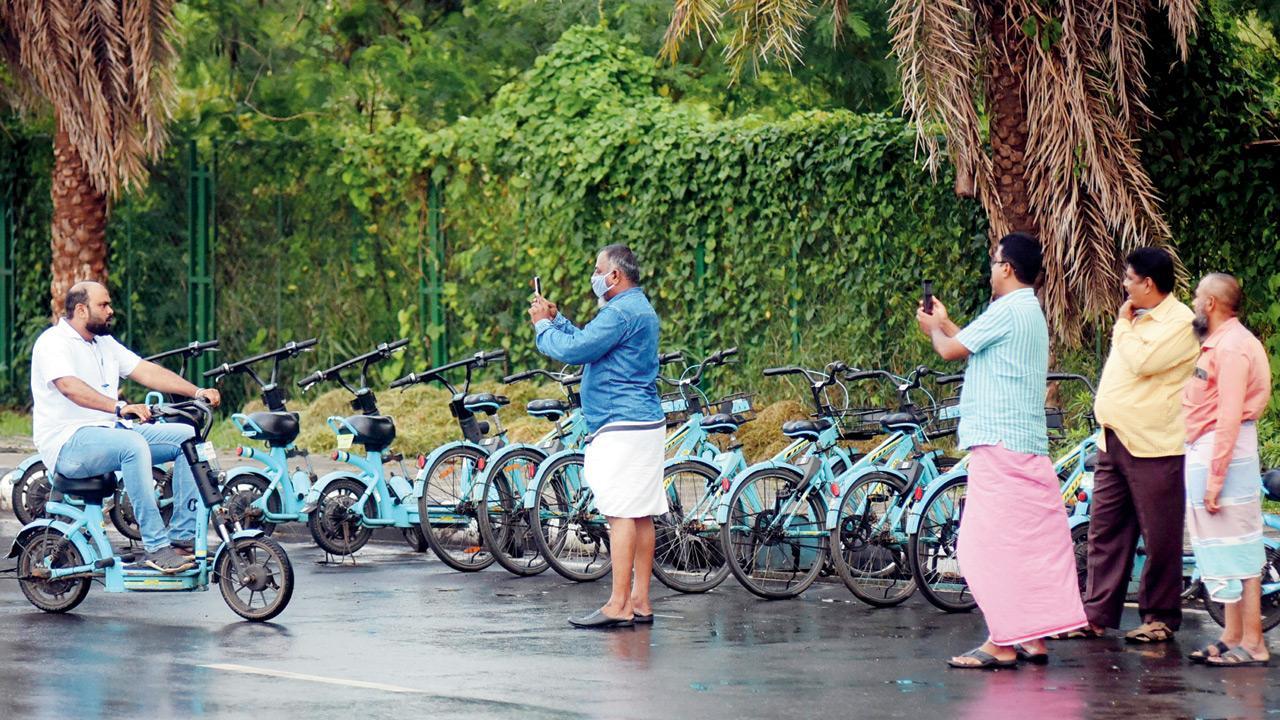The city - sliced, diced and served with a dash of sauce

Pic/Sameer Markande
Wheel you take a picture?
ADVERTISEMENT
A man on an e-bike on Palm Beach Road in Navi Mumbai poses for photographs.
Farewell, Rashid Irani
Rashid Irani at his Marine Lines residence in May this year. Pic/Bipin Kokate
Yesterday was a sad day for Mumbai’s film fraternity. Rashid Irani, a beloved critic who wrote film reviews for national dailies and publications, passed away at his Marine Lines residence. This paper had run an interview with him in May this year, where Irani had confessed how he was facing a crippling sense of loneliness due to the lockdown. He lived alone for the better part of his life, and hardly had any worldly possessions apart from about 5,000 books and movies, which he described as his “real wealth”. His friends became suspicious when there had been no contact from him since July 30, and they broke open the door with the police’s help to find he had collapsed in the bathroom.
Rashid Irani at the Brabourne Restaurant in Mumbai in 1984. Pic/Extracted with permission from Sooni Taraporevala/ Parsis: The Zoroastrians of India
The Mumbai Press Club said in a statement, “He was one of the Press Club Film Society pillars and a core member of the club, who didn’t miss a day at the media centre writing his reviews and watching films.” Meanwhile, long-term friend and fellow film journalist Rafique Baghdadi shared with this diarist how Irani was a “complete cinema man”. “He ate and slept cinema, a medium that was the most important thing in his life. He attended all the different festivals across the country, and watched all films that various consulates screened. Lately, he had been watching a lot of films on Mubi [an OTT platform] and with his passing away, there is hardly anyone else left to tell you what cinema in Bombay was like in the old times, which film societies existed, and where you could get to watch rare films,” Baghdadi told us, adding, “But the lockdown made him lonely, for which there is no remedy.”
Nostalgic about Partition
Ragini Kashyap, who runs an initiative called Third Culture Cooks, has launched a series of postcards, called Postcards from Partition. It’s an extension of a project she started last year, where she invited food researchers and historians, and people who are still surviving from that era, to share a photograph and a recipe of dishes that date back to that time. Food show director Shubhra Chatterji (in pic) contributed with details of besan ka halwa, for example. “My grandparents made the dish in India after being uprooted from Pakistan, because of a shortage of flour,” she shared. To know more, log on to @thirdculturecooks on Instagram.
Tune into a piece of history
A seminal musical event took place exactly 50 years ago this week. The Concert for Bangladesh was held at Madison Square Garden in New York to raise funds for India’s neighbour, after that country was ravaged by the genocide that took place as a consequence of the Bangladesh Liberation War. Sitar maestro Ravi Shankar and ex-Beatles member George Harrison (below) had helped organised it, and Anoushka Shankar, the former’s daughter, shared a throwback video in which the duo talk about the concert’s influence, and how “in one day, the whole world knew the name of Bangladesh’’. Mumbai-based veteran rock musician Gary Lawyer also reminded us of a funny moment at the concert. He said, “Ravi Shankar had been tuning his guitar and the audience clapped thinking it was part of his performance. He then told them, ‘If you like our tuning so much, I hope you will enjoy the playing more!’”
Of the city and the sea
The webinar will examine how the sea has shaped the architecture in Mumbai
As an island city, Mumbai rose to prominence due to its favourable location and natural harbour. The sea and its proximity have been a major influence on the city’s architecture as well its social and cultural fabric. This is what Atul Kumar, founder-trustee of Art Deco Mumbai, will examine, during a webinar this Saturday.
“Bombay’s development, layout, social and cultural evolution, and architecture have drawn heavily from the sea, from the very first reclamation to the recent coastal road. We will look at how this spatial and cultural transition has taken place, with the help of visual illustrations. In terms of architecture, the city’s port status has contributed various styles, including Victorian, Indo-Gothic, Neo-classical, Indo-Saracenic, to give a unique character to its built form that was functional and meaningful,” he shared. To register, visit @artdecomumbai on Instagram.
 Subscribe today by clicking the link and stay updated with the latest news!" Click here!
Subscribe today by clicking the link and stay updated with the latest news!" Click here!







